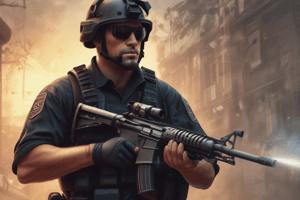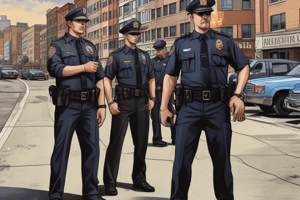Podcast
Questions and Answers
What does Phase A of the Substantive Topics focus on?
What does Phase A of the Substantive Topics focus on?
- Critical incident responses
- Proactive patrol activities
- Criminal investigations
- Routine incident response (correct)
Which of the following is NOT included in the Substantive Topic areas?
Which of the following is NOT included in the Substantive Topic areas?
- Patrol activities
- Emergency response
- Criminal investigation
- Community service programs (correct)
Which Core Competency entails the safe operation of police vehicles?
Which Core Competency entails the safe operation of police vehicles?
- Police Vehicle Operations (correct)
- Use of Force
- Procedures, Policies, Laws and Philosophies
- Conflict Resolution
What do trainees focus on during each phase of training?
What do trainees focus on during each phase of training?
Which Phase addresses critical incidents?
Which Phase addresses critical incidents?
Why might training areas be added or removed?
Why might training areas be added or removed?
Which Core Competency involves managing conflict effectively?
Which Core Competency involves managing conflict effectively?
What does Phase D encompass?
What does Phase D encompass?
Which aspect of training is NOT focused on police officers?
Which aspect of training is NOT focused on police officers?
What is emphasized regarding the Use of Force?
What is emphasized regarding the Use of Force?
What is the primary focus of effective leadership in policing?
What is the primary focus of effective leadership in policing?
What is followership primarily concerned with in a team environment?
What is followership primarily concerned with in a team environment?
Which of the following best describes problem-solving skills in policing?
Which of the following best describes problem-solving skills in policing?
What does cultural inclusivity in policing emphasize?
What does cultural inclusivity in policing emphasize?
What role does individual rights play in policing?
What role does individual rights play in policing?
Which aspect is essential for ensuring officer safety?
Which aspect is essential for ensuring officer safety?
Effective communication skills include which of the following?
Effective communication skills include which of the following?
What is the importance of ethics in policing?
What is the importance of ethics in policing?
How should legal authority be exercised in policing?
How should legal authority be exercised in policing?
What is the function of the Learning Matrix in police training?
What is the function of the Learning Matrix in police training?
Study Notes
Substantive Topics in Training
- Single training manual cannot cover all agency needs due to varying procedures, laws, and community issues.
- Most commonly identified instruction topics include domestic violence, patrol procedures, critical incidents, criminal investigation, and local regulations.
- Organized into four Substantive Topic areas:
- Non-Emergency Incident Response: Routine and non-emergency responses.
- Emergency Incident Response: Handling critical incidents and emergencies.
- Patrol Activities: Focuses on proactive patrolling.
- Criminal Investigation: Initial and follow-up investigations.
Training Accountability
- Trainees are accountable for learning in current and previous phases of training.
- Training will cross over into other Substantive Topics when necessary, but accountability begins in the assigned phase.
Core Competencies for Police Officers
- Key competencies essential for all police officers include:
- Police Vehicle Operations: Safe and effective operation of police vehicles.
- Conflict Resolution: Management of conflicts among the public and government entities.
- Use of Force: Knowledge of self-defense and arrest techniques, emphasizing legality and necessity.
- Procedures, Policies, Laws: Familiarity with operational manuals, local laws, and modern policing philosophies.
- Report Writing: Skills in documentation including forms and narratives.
- Leadership: Influencing behavior to achieve organizational goals; effective followership.
- Problem-Solving Skills: Use of critical thinking and resource recognition to address issues.
- Community Specific Problems: Understanding unique community needs for tailored service.
- Cultural Inclusivity: Awareness and respect for cultural differences in policing.
- Legal Authority: Appropriate use of authority and discretion.
- Individual Rights: Recognition of individual rights and constitutional considerations.
- Officer Safety: Awareness and practices ensuring officer safety during operations.
- Communication Skills: Proficiency in verbal, non-verbal, and written communication.
- Ethics: Commitment to ethical decision-making in police activities.
- Emotional Intelligence: Self-awareness, stress management, and social relationship skills.
Learning Matrix Overview
- The Learning Matrix serves as a reference tool rather than a checklist, aiding in tracking training progress.
- Four Substantive Topic areas form the matrix's horizontal axis:
- Non-Emergency Incident Response
- Emergency Incident Response
- Patrol Activities
- Criminal Investigation
- Core Competencies are listed vertically, supporting training in diverse policing scenarios.
- Matrix content is regularly updated to reflect changes in laws, policies, and procedures relevant to each cell.
- Each matrix cell specifies the applicable policies, procedures, and legal directives pertinent to policing activities.
Studying That Suits You
Use AI to generate personalized quizzes and flashcards to suit your learning preferences.
Description
This quiz delves into the critical instructional topics identified by various agencies for law enforcement training. It highlights the need for adaptability in departmental procedures in response to changing laws and social issues. Key areas of focus include domestic violence, patrol methods, and handling critical incidents.




